In an era of rising energy costs, homeowners are increasingly looking for ways to penny-pinch their utility bills and reduce their environmental footprint. Water heating stands out as one of the primary drivers of residential energy use. According to the US Department of Energy, heating water accounts for about 18% of your home’s energy use, making it the second biggest energy expense.
Traditional water heating solutions are often inefficient and costly over time, prompting the need for more sustainable alternatives. Enter hybrid water heaters, innovative appliances that promise to save money, enhance energy efficiency, and integrate seamlessly with modern smart home technologies.
How Heat Pump Water Heater Works
What is a Hybrid Water Heater?
A hybrid water heater, also known as a heat pump water heater, is a device that combines traditional water heating methods with modern heat pump technology. Heat pumps operate much like refrigerators, but in reverse, they extract heat from the air or ground to heat water, drastically reducing the amount of electrical energy required to maintain the water at a desired temperature.
How Do Hybrid Water Heaters Work?
While traditional electric or gas water heaters use electricity or gas to heat the water directly, the hybrid water heaters use electricity to operate their system. The water heating process in hybrid water heaters lies in the circulation of the refrigerant, a substance used to transfer heat from indoor air to the water in the heating cycle. Having a hybrid water heater means killing two birds with one stone: you pay less for your energy bills and reduce your carbon footprint.
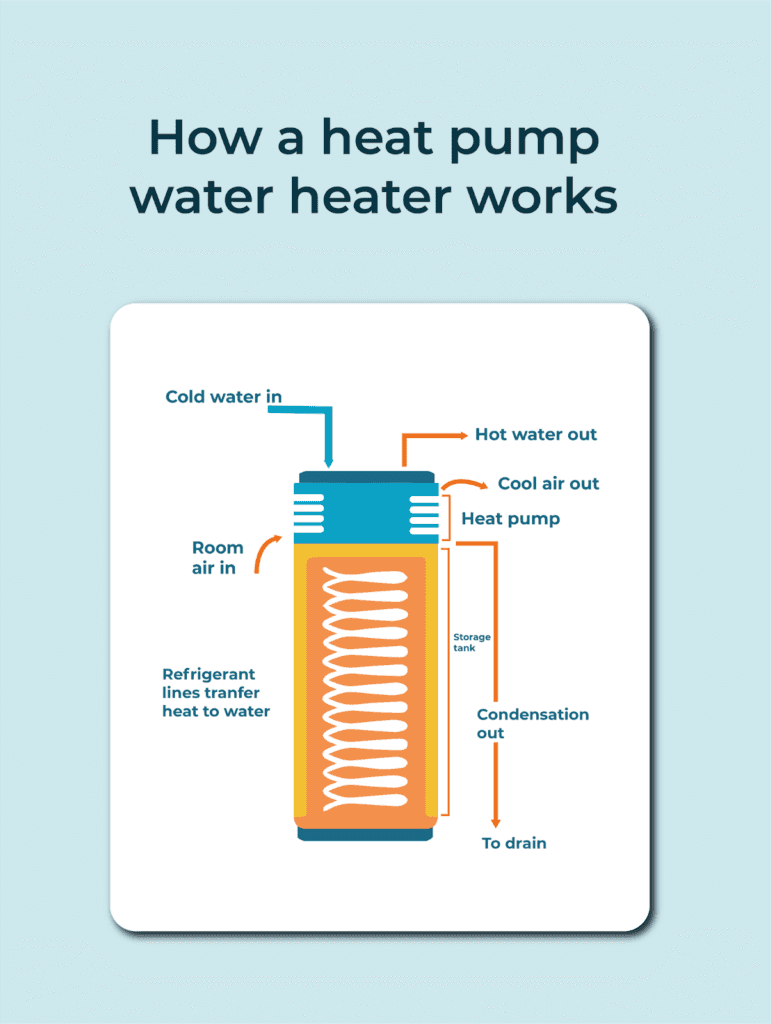
Another great point about hybrid water heaters is their flexibility. When you have more people at home and increased hot water demand—like when friends or family are staying over—the hybrid water heater can switch heating modes. It will combine heat pump technology with a standard heating method to make sure that you and your guests have enough hot water for everyone. This makes hybrid water heaters both efficient and practical for everyday use.
For Nerds (Heat Pump Components)
Below you can see components of the heat pump water heater, and understand how each of them operate. This might be useful for your future DIY experiments.
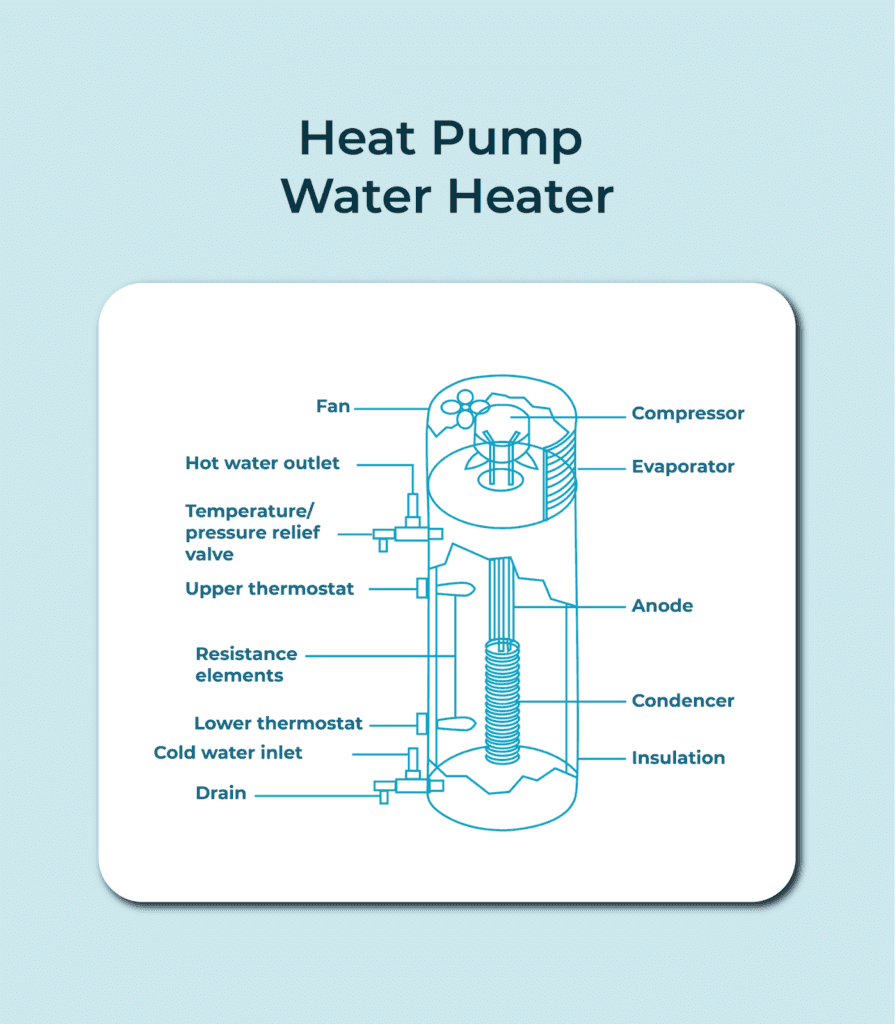
Hybrid Mode and Flexibility
Electric Heating Elements
Most heat pump water heaters are equipped with electric heating elements alongside the heat pump. These elements offer versatility, enabling users to switch between heat pump only mode, hybrid mode, or standard electric mode based on their hot water demands. In hybrid mode, the heat pump primarily operates, but the electric elements supplement when hot water usage surpasses a certain threshold, ensuring consistent hot water availability.
Optimizing Usage for Maximum Savings
Many users opt to increase their tank size when transitioning to a heat pump water heater. This strategy allows them to operate mostly in heat pump only mode, maximizing energy efficiency and cost savings over time.
Smart Features of Hybrid Pump Water Heater
Eco-Friendly Operation
Hybrid water heaters, resembling air-to-water heat pumps, harness renewable energy from the surrounding air to heat water. This thermodynamic process reduces dependency on non-renewable energy sources and minimizes greenhouse gas emissions, offering a sustainable alternative to traditional water heating systems. By transferring ambient heat to the domestic hot water circuit, these devices utilize free, inexhaustible energy sources, making them an environmentally responsible choice for eco-conscious homeowners.
Environmental Impact
Traditional water heaters, whether powered by electricity or gas, significantly contribute to household energy consumption and environmental degradation. These systems require substantial amounts of energy, which often leads to high utility bills and increased carbon emissions. Moreover, the production and disposal of conventional water heaters involve the use of finite resources, contributing further to environmental strain.
In contrast, hybrid water heaters offer a compelling advantage by significantly lowering greenhouse gas emissions and reducing the overall carbon footprint. According to estimates from energystar.gov, replacing all residential water heaters with heat pump water heaters could lead to annual savings of $12 billion and reduce greenhouse gas emissions by up to 140 billion pounds. They operate more efficiently, curbing energy waste and reducing water wastage as they quickly bring water to the desired temperature without the long wait times associated with conventional heaters.
Smart Technology Integration
Hybrid water heaters are equipped with advanced smart features that enhance their efficiency and user convenience:
- Customizable Heating Schedules
Homeowners can program their hybrid water heater to align with their daily routines, ensuring hot water is available when needed and conserving energy when it’s not.
- Remote Control via Smartphone App
Many models are compatible with smartphone apps, allowing users to adjust settings, monitor energy use, and control their water heater remotely, which adds a layer of convenience and accessibility.
- Energy-Saving Modes
Features like vacation and sleep modes help minimize energy consumption during periods of low demand, thus lowering operating costs and extending the unit’s life.
- Performance Monitoring and Alerts
These smart water heaters provide real-time data on energy consumption and operational status. Users receive alerts for maintenance needs or performance issues, enabling proactive upkeep and ensuring continuous efficiency.
By integrating these smart features, hybrid water heaters not only contribute to environmental conservation but also offer efficient, cost-effective solutions for residential hot water needs. This makes them an ideal choice for modern, sustainable living.
For more information, you may follow the link and watch explanatory videos.
Cost Considerations
Hybrid heat pump/electric resistance systems may initially have higher upfront costs compared to traditional water heating systems. However, their superior energy efficiency can result in significant long-term cost savings for homeowners.
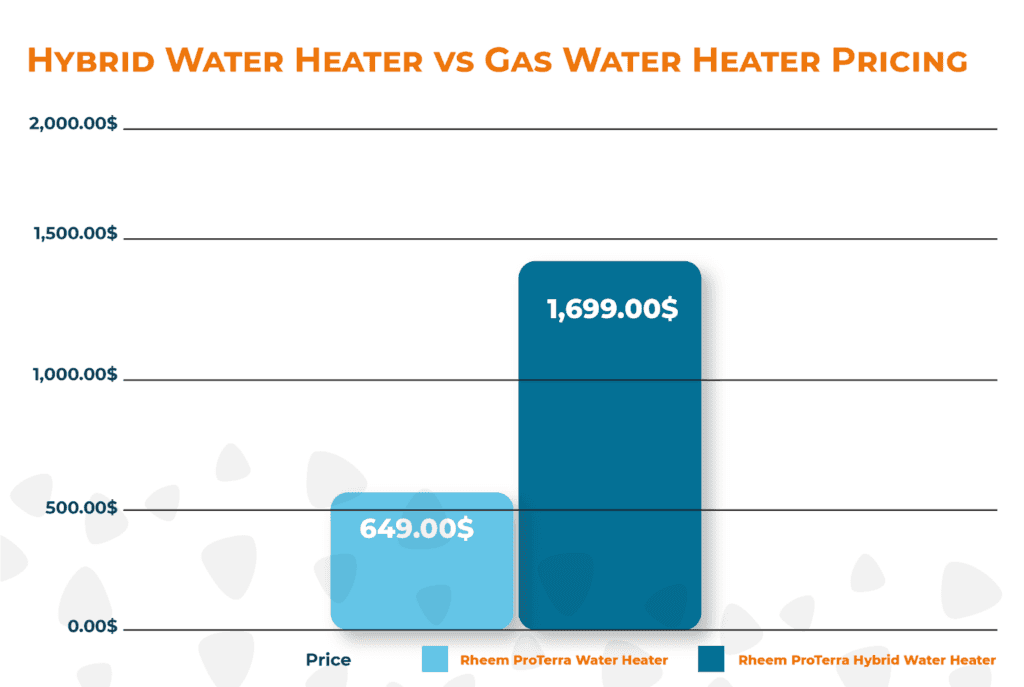
A hybrid water heater is 2.5 times more expensive than a conventional gas model, but it will save you more in the future. The main reason lies in the long-runprice changes of natural gas.
The fact is that hybrid water heaters can be up to three times more energy-efficient. Traditional electric and gas heaters generate heat directly in the water, which requires a significant amount of energy. Tankless water heaters, while efficient in their right, often struggle to supply consistent hot water during high demand. Hybrid water heaters bridge these gaps by offering both efficiency and reliability.
The actual cost-effectiveness of a hybrid water heater depends on the individual’s usage profile. If hot water usage is staggered to minimize the use of electric resistance heating, the overall electric usage can be reduced to approximately 25% of what would be consumed by a standard electric resistance water heater.
Suitability of a heat pump system is also influenced by environmental factors. For instance, in regions like California with its ample air volume and moderate temperatures, heat pumps operate efficiently. In such environments, the heat pump water heater can provide noticeable cooling and dehumidification benefits, particularly in areas like attached garages.

As you can see from the graph above, the heating bill savings will pay you starting from year one, and you will notice big changes from year five. In the long term run, this is the best option.
Considering these factors, the long-term savings potential of hybrid water heaters becomes apparent. While the initial investment may be higher, prudent usage habits and favorable environmental conditions can lead to substantial energy savings and lower operating costs over time. This makes hybrid water heaters an economically viable choice for homeowners looking to minimize their energy expenses while enjoying a reliable hot water supply.
Installation and Maintenance Tips

As you embark on the journey of upgrading to a hybrid water heater for your home, understanding how to install and maintain it properly is key to maximizing its efficiency and lifespan. Let’s delve into some practical tips and considerations.
Installation Insights
- Location Matters
Choose a location for your hybrid water heater that maintains a consistent temperature between 40°F and 90°F throughout the year. Adequate space around the heater, with at least 1,000 cubic feet of air space and sufficient height, ensures proper ventilation and performance.
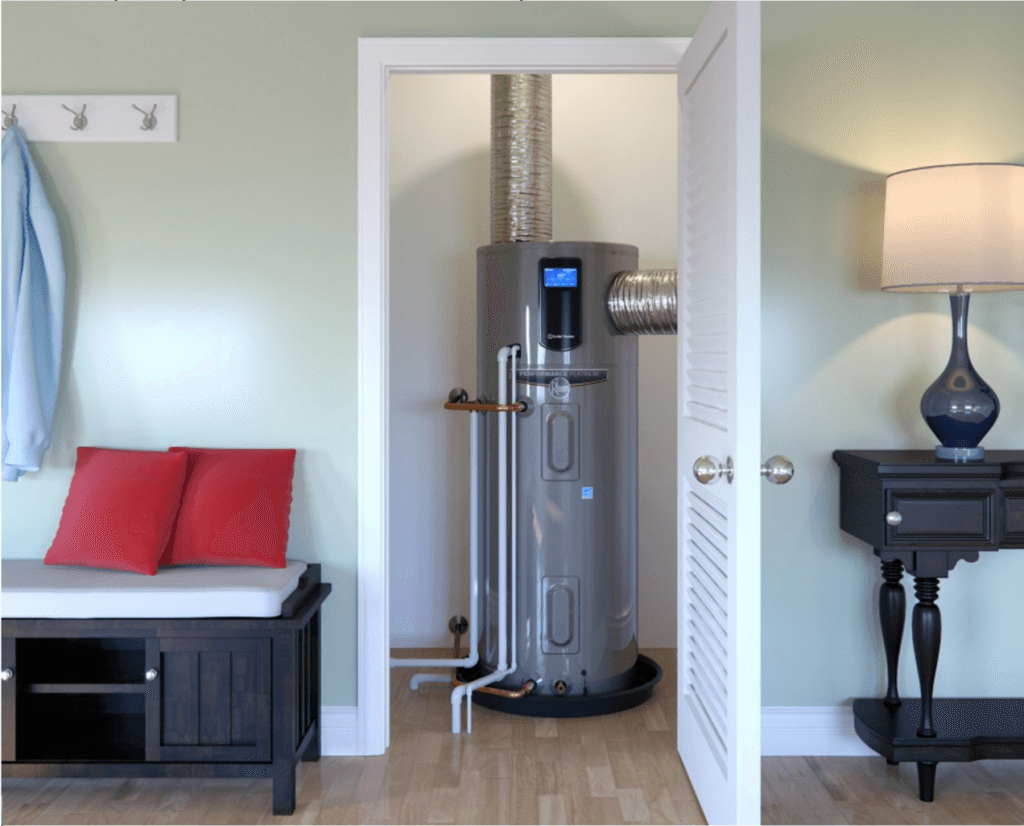
- Expert Installation
Opt for a plumber experienced with hybrid water heaters. Their expertise can ensure a seamless and efficient installation, avoiding common pitfalls and maximizing the benefits of your new system.
- Right-Sized Tank
Consider selecting a hybrid water heater with a slightly larger tank than what’s typically recommended for your household. This decision can help reduce the reliance on auxiliary heating modes, improving overall energy efficiency.
- Smart Thermostat Benefits
Look for a hybrid water heater equipped with a smart thermostat. These advanced features allow for customized settings based on your usage patterns, optimizing energy savings and ensuring a consistent supply of hot water as needed.
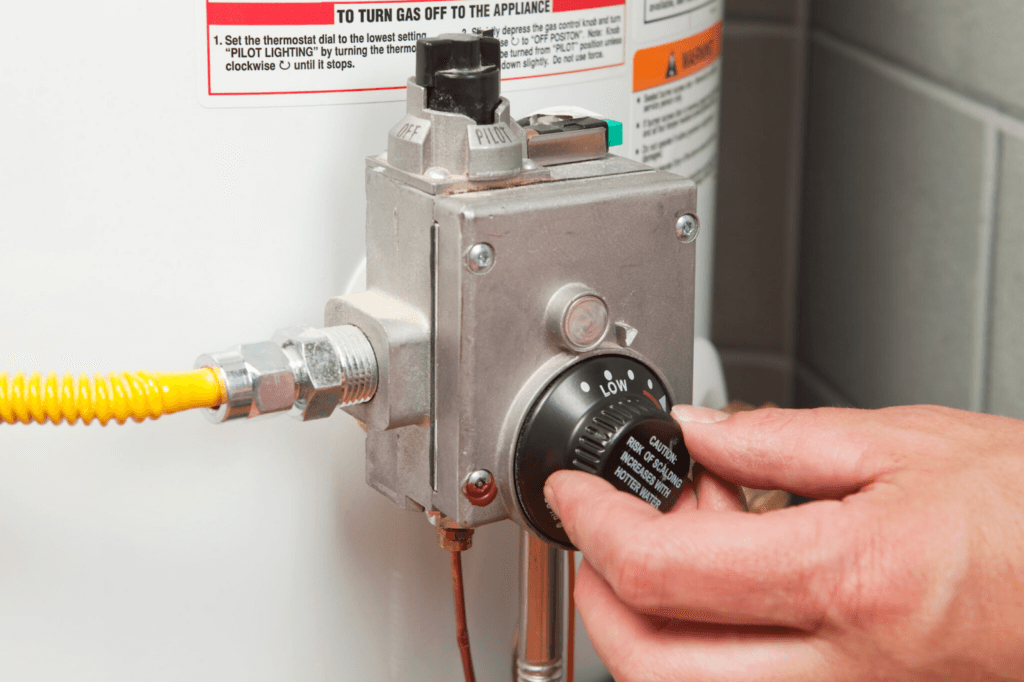
Maintenance Practices for Longevity
- Regular Flushing
Plan to flush out your water heater regularly, ideally every 6 to 12 months. This maintenance task helps remove sediment and limescale buildup, ensuring efficient heating and preventing potential issues with water flow and temperature.
- Filter Cleaning
Keep an eye on the filter located on top of the heat pump. Cleaning it every few months with mild detergent and water can help maintain the optimal operation and performance of your hybrid water heater.
- Condensate Drain Care
Once a year, treat the condensate drain to prevent clogs and backups. A simple cup of bleach poured into the drain can eliminate algae, mold, or mildew, ensuring smooth drainage and system functionality.
- TPR Valve Check
Annually, check the temperature pressure relief valve (TPR) to ensure it’s functioning correctly. This valve plays a crucial role in keeping your water heater and home safe, so regular inspections are essential.
By following these installation and maintenance tips, you not only enhance the efficiency and longevity of your hybrid water heater but also contribute to energy savings and a more sustainable home environment. Making informed choices and staying proactive with upkeep can lead to years of reliable hot water supply and cost-effective operation.
Additional information (Warranty, Rebates)
Installing a hybrid water heater means choosing a superior technology, but did you know that you can benefit from substantial savings that you can receive?
Generous Rebates: With available government incentives and tax credits, you can claim up to $6,500 in rebates for upgrading your water heater.
Peace of Mind with a 10-Year Warranty: Enjoy a decade of worry-free operation, knowing that your investment is covered with our robust 10-year warranty.
Proven Track Record: Join the ranks of satisfied homeowners; we’ve successfully installed over 200 hybrid water heaters, each helping to cut energy bills and reduce environmental impact.
Whether you’re a couple or a bustling household of five or more, we have the perfect size to keep your showers warm and your costs down:
- 40-gallon tanks for smaller families, ensuring three hot showers back-to-back.
- 50-gallon tanks for families with two children, comfortable for four consecutive showers.
- 65-gallon options cater to households with three children, offering five sequential showers.
- 80-gallon units for larger families, providing six uninterrupted showers.
From securing the necessary permits to guiding you through the rebate process, IRBIS HVAC handles everything. We make it simple and stress-free to switch to a more efficient water heating system. Ready to make the switch and enjoy the savings? today for a free consultation and learn more about how our hybrid water heaters can transform your home’s comfort and energy consumption.
Conclusion
Heat pump water heaters do require a higher initial investment compared to traditional water heaters, but they offer significant cost savings over time. Here are the main reasons why this investment pays off in the long run:
- Energy Efficiency
Hybrid water heaters combine the best of traditional and heat pump technologies, offering exceptional energy efficiency and reducing electricity consumption by up to 60% compared to standard electric water heaters.
- Smart Features
With programmable settings, smart thermostats, and energy-saving modes, hybrid water heaters adapt to your hot water usage patterns, ensuring optimal performance while minimizing wastage.
- Cost Savings
While the upfront investment may be higher, the long-term cost savings from reduced energy bills and potential incentives or rebates make hybrid water heaters a financially prudent choice.
- Environmental Sustainability
By lowering greenhouse gas emissions, conserving energy, and promoting eco-friendly practices, hybrid water heaters contribute positively to environmental conservation and sustainability efforts.
We urge readers to take action and consider upgrading to a hybrid water heater for their homes. Here are some steps you can take:
- Explore Different Models
Research and compare various hybrid water heater models to find the one that best suits your needs and budget.
- Consult with a Professional Installer
Seek guidance from experienced professionals like IRBIS HVAC to ensure proper installation, maintenance, and optimal performance of your hybrid water heater.
- Take Advantage of Available Incentives
Investigate potential incentives, rebates, or tax credits offered by governmental bodies or utility providers for installing energy-efficient appliances like hybrid water heaters.
Embrace the future of water heating with a hybrid water heater and make a meaningful difference in energy efficiency, cost savings, and environmental responsibility. Your choice today can lead to a greener, more sustainable tomorrow for you and future generations. Contact IRBIS HVAC for expert advice and assistance in upgrading to a hybrid water heater today.
FAQ
Are hybrid water heaters suitable for all climates?
Hybrid water heaters are generally suitable for a wide range of climates, especially in areas where the ambient temperature typically remains above freezing. They are most efficient in warm and moderate climates because they extract heat from the surrounding air. In colder environments, their efficiency can decrease, as the heat pump has to work harder to extract heat from colder air. Some models are equipped with systems to operate efficiently in colder climates, but it’s essential to choose a unit designed for your specific climate conditions.
Can hybrid water heaters be integrated with existing plumbing systems?
Yes. They are similar in size and fitting requirements to traditional electric water heaters, making them a straightforward replacement in most cases that does not require significant modifications. However, it’s important to ensure that any existing plumbing can accommodate the pressure and flow rates required by a hybrid unit. Consulting with a professional installer is recommended to assess specific needs and any potential adjustments.
What is the average lifespan of a hybrid water heater?
The average lifespan of a hybrid water heater is typically around 10 to 15 years, which is comparable to or slightly better than traditional electric water heaters. The lifespan can be extended with proper maintenance and care. Factors that may influence durability include the quality of the installation, the regularity of maintenance, and the hardness of the water.
Are there any specific maintenance requirements for hybrid water heaters?
Hybrid water heaters do require some specific maintenance to operate efficiently. Regular tasks include:
- Cleaning air filters: To ensure efficient operation, the air filters of the heat pump must be cleaned regularly, typically every three months.
- Checking the system: Annual inspections by a qualified technician are recommended to check the anode rod and ensure the system is operating correctly.
- Flushing the tank: Depending on water quality, periodically flushing the tank to remove sediment that could affect efficiency is advisable.
How do hybrid water heaters perform in power outages?
During a power outage, hybrid water heaters will not operate, as they require electricity to run the heat pump and other components. This means that hot water will not be available during an outage unless the system has a backup power source, such as a generator. Some models may include conventional electric resistance heaters that can optionally be used during outages if power is available via backup.
Can I qualify for green energy incentives with a hybrid water heater?
Yes, purchasing a hybrid water heater can qualify you for various green energy incentives. Many local, state, and federal programs offer rebates, tax credits, or other incentives for installing energy-efficient appliances like hybrid water heaters. These incentives are designed to encourage homeowners to invest in more sustainable technology. It’s advisable to check with local utility companies or government agencies to find out what incentives are available in your area.
How do hybrid water heaters impact indoor air quality?
Since hybrid water heaters extract heat from the air, they can potentially affect indoor temperatures and humidity levels. In spaces like basements or enclosed garages, they might cool and slightly dehumidify the air, which could be beneficial in damp areas. However, in living spaces, it’s essential to ensure adequate ventilation to balance the effect.
Are there different types of hybrid water heaters for specific residential needs?
Hybrid water heaters come in various sizes and designs to accommodate different residential needs and spaces. Some models are better suited for smaller homes with limited space, offering compact designs, while others are designed for larger homes with higher hot water demands.
What should be considered when transitioning from gas to hybrid water heaters?
Transitioning from a gas to a hybrid water heater involves a few considerations, including the availability of sufficient electrical infrastructure to support the hybrid system. It may require upgrading your home’s electrical system to accommodate the higher electrical demands. Additionally, proper venting and drainage must be ensured to handle the condensate produced by the heat pump.

